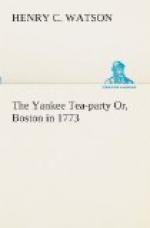“I saw him soon after he joined the Legion,” said Hanson. “Colonel Lee considered him his best officer, I believe.”
“Yes,” said Kinnison, “he was one of the best officers in the army—conducting sieges as well as he did partisan movements. Not long before the British evacuated Charleston, Captain Rudolph performed two remarkable exploits that tell the character of the man better than words can. The left of the British line was at a place called the Quarter House, near Charleston, on what is called the Neck. To protect this post on the water-side, the enemy had a large armed galley, well manned and equipped. Captain Rudolph, gaining a knowledge of the exact position of the galley and her force, formed a plan to capture, or least destroy her. He chose only sixteen men—the most daring and enterprising in the Legion, and informed them of his scheme. They were eager for such enterprises, and everything was soon arranged. A night was fixed upon, and boats prepared. There was no moon upon that night, which made it favourable to secrecy. At the appointed time, Rudolph and his men rowed with muffled oars and ready weapons towards the place where the galley was anchored. They had to pass very near the British sentinels on the Neck, but were not discovered; and they reached the side of the galley before any of the British were aware that the enterprise was afoot. Twenty-six men who were aboard the galley were made prisoners with scarcely any resistance, so sudden was the attack. These prisoners were hurried into the boats; and then Captain Rudolph, seeing that he couldn’t get the galley away from the place in time to get out of the enemy’s reach, set fire to her. The party then gave a shout and pulled away towards the shore from which they had started. The enemy were alarmed by the firing of the sentinels, the glare of the burning galley and the shout of the daring band, and fired some of their artillery after Rudolph. But it was too late; the Americans escaped, and the galley was burned to the water’s edge.”
“That was equal to Decatur’s burning of the Philadelphia,” said Hand.
“It was,” replied Kinnison. “Rudolph was very much of a Decatur in spirit. Soon after the enterprise I’ve just mentioned. Captain Rudolph attacked a party of black dragoons who were out foraging for the British. The blacks were defeated, and many of them taken. In the course of the fight, Rudolph engaged one of the largest-sized and boldest of the black dragoons in a regular hand-to-hand combat; and in a very short time dismounted and captured him.”




